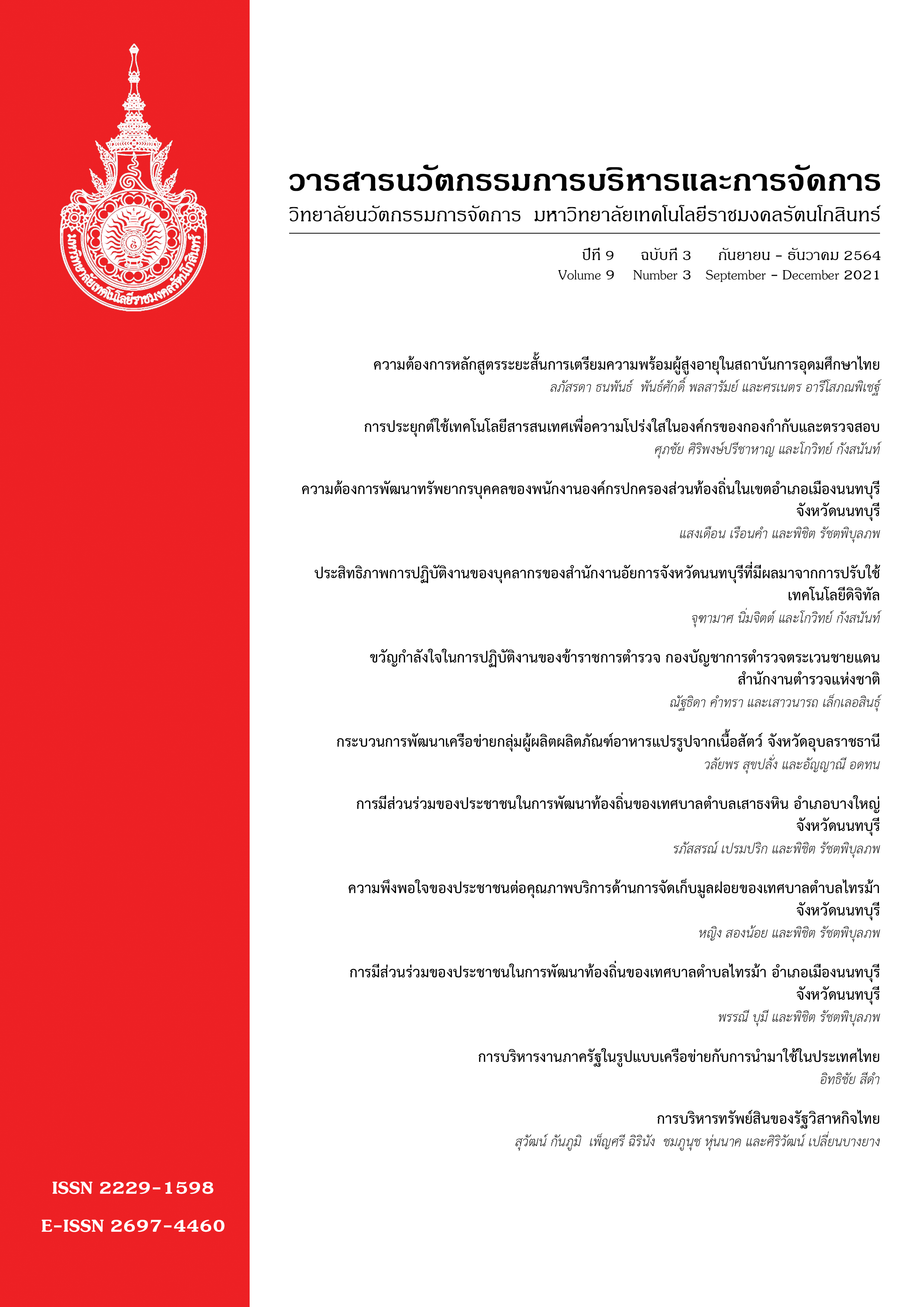Demands of Short-Term Courses for Elderly Readiness in Thai Higher Education Institutions
Main Article Content
Abstract
The objectives of this research were to study the demands and appropriate teaching methods of short-term courses for elderly readiness in Thai Higher Education Institutions. 1,604 samples were elders and interested people from each of the six regions of the country. The tools used in this descriptive research was questionnaires. Data analysis was conducted through content review. The statistics used were frequency and percentage. The research found that: (1) The demands of short-term courses as a whole; The top five subjects were holistic health care for the elders (51.81%), nutrition suitable for the elders (48.25%), exercise for the elders (44.56%), diseases to be aware of among the elder (40.05%), and physiotherapy and counseling for the elders (32.79%). (2) The results of comparison of the demands of Elder Program by five groups found that the general group (20-49 years) and the preparatory group (50-59 years) viewed that the appropriate teaching methods were online teaching, teaching from practice and teaching through social media while the primary-elder group (60-69 years), the middle-aged group (70-79 years) and the late-elder group (80 years and over) agree that it should be teaching from online teaching and teaching in the classroom. In addition, the general group (20-49 years), the preparatory group (50-59 years) and the preliminary elder group (60-69 years) viewed that the appropriate teaching medias were social media and multimedia. The middle-aged group (70-79 years) thought it should be social media and television, and the late-aged group (80 years and over) viewed that the appropriate teaching media was on television.
Article Details
ข้อความและบทความในวารสารนวัตกรรมการบริหารและการจัดการ เป็นแนวคิดของผู้เขียน ไม่ใช่ความคิดเห็นและความรับผิดชอบของคณะผู้จัดทำ บรรณาธิการ กองบรรณาธิการ วิทยาลัยนวัตกรรมการจัดการ และมหาวิทยาลัยเทคโนโลยีราชมงคลรัตนโกสินทร์
ข้อความ ข้อมูล เนื้อหา รูปภาพ ฯลฯ ที่ได้รับการีพิมพ์ในวารสารนวัตกรรมการบริหารและการจัดการ ถือเป็นลิขสิทธิ์ของวารสารนวัตกรรมการบริหารและการจัดการ หากบุคคลใดหรือหน่วยงานใดต้องการนำทั้งหมดหรือส่วนหนึ่งส่วนใดไปเผยแพร่ต่อหรือกระทำการใดๆ จะต้องได้รับอนุญาติเป็นลายลักษณ์อักษรจากวารสารนวัตกรรมการบริหารและการจัดการก่อนเท่านั้น
References
พิษณุโลกฮอตนิวส์. (2563). โรงเรียนผู้สูงอายุ ติดอาวุธทางปัญญาให้สูงวัย พร้อมรับมือวิกฤติ. สืบค้น 4 กันยายน 2564, จาก https://www.phitsanulokhotnews.com/2020/07/21/144941.
เวหา เกษมสุข. (2562). แนวทางส่งเสริมการเรียนรู้ตลอดชีวิตของโรงเรียนผู้สูงอายุ. วิทยานิพนธ์ หลักสูตรศึกษาศาสตรดุษฎีบัณฑิต, สาขาวิชาการศึกษาตลอดชีวิตและการพัฒนามนุษย์, บัณฑิตวิทยาลัย, มหาวิทยาลัยศิลปากร.
สุปาณี จันทรมาศ และนวพร วิริยานุพงศ์. (2556.). ระบบบำเหน็จบานาญของไทย. วารสารการเงินการคลัง, 25(74), (มกราคม-มีนาคม 2556), 68-78.
สำนักงานเลขาธิการสภาการศึกษา. (2561). รายงานการวิจัยเปรียบเทียบเพื่อพัฒนานโยบาย เรื่อง การส่งเสริมการเรียนรู้ของผู้สูงอายุในประเทศไทย. กรุงเทพฯ: พริกหวานกราฟฟิค.
สำนักงานส่งเสริมการศึกษานอกระบบและการศึกษาตามอัธยาศัย. (2551). คัมภีร์ กศน. กรุงเทพฯ: ห้างหุ้นส่วนจำกัด เอ็น.เอ.รัตนะเทรดดิ้ง.
สำนักข่าว Hfocus. (2561). เจาะลึกระบบสุขภาพ. สืบค้น 5 กันยายน 2564, จาก https://www.hfocus.org/.
สยามรัฐออนไลน์. (2561). โรงเรียนผู้สูงอายุศาสตร์เพื่อชีวิตที่เป็นสุข, สืบค้น 4 กันยายน 2564, จาก https://siamrath.co.th/n/39731.
PopulationPyramid.net (2021). Population Pyramids of the World from 1950 to 2100. Retrieved September 4, 2021, from https://www.populationpyramid.net/world/2021/.
UNDP. (2019). Human Development Report 2019: Beyond income, beyond averages, beyond today: Inequalities in human development in the 21st Century.


